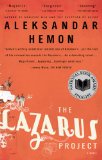Summary | Excerpt | Reviews | Beyond the Book | Readalikes | Genres & Themes | Author Bio

Excerpt
The Lazarus Project
The time and place are the only things I am certain of: March 2, 1908,
Chicago. Beyond that is the haze of history and pain, and now I
plunge:
Early in the morning, a scrawny young man rings the bell at 31
Lincoln Place, the residence of George Shippy, the redoubtable
chief of Chicago police. The maid, recorded as Theresa, opens the
door (the door certainly creaks ominously), scans the young man
from his soiled shoes up to his swarthy face, and smirks to signal
that he had better have a good reason for being here. The young
man requests to see Chief Shippy in person. In a stern German accent,
Theresa advises him that it is much too early and that Chief
Shippy never wishes to see anybody before nine. He thanks her,
smiling, and promises to return at nine. She cannot place his accent;
she is going to warn Shippy that the foreigner who came to
see him looked very suspicious.
The young man descends the stairs, opens the gate (which also
creaks ominously). He puts his hands in his pockets, but then
pulls his pants up—they are still too big for him; he looks to the
right, looks to the left, as though making a decision. Lincoln Place
is a different world; these houses are like castles, the windows tall
and wide; there are no peddlers on the streets; indeed, there is
nobody on the street. The ice-sheathed trees twinkle in the morning
drabness; a branch broken under the weight of ice touches the
pavement, rattling its frozen tips. Someone peeks from behind a
curtain of the house across the street, the face ashen against the
dark space behind. It is a young woman: he smiles at her and she
quickly draws the curtain. All the lives I could live, all the people I
will never know, never will be, they are everywhere. That is all that
the world is.
The late winter has been gleefully tormenting the city. The pure
snows of January and the spartan colds of February are over, and
now the temperatures are falseheartedly rising and maliciously
dropping: the venom of arbitrary ice storms, the exhausted bodies
desperately hoping for spring, all the clothes stinking of stove
smoke. The young man’s feet and hands are frigid, he flexes his
fingers in his pockets, and every step or two he tiptoes, as if dancing,
to keep the blood going. He has been in Chicago for seven
months and cold much of the time—the late-summer heat is now
but a memory of a different nightmare. One whimsically warm day
in October, he went with Olga to the lichen-colored lake, presently
frozen solid, and they stared at the rhythmic calm of the oncoming
waves, considering all the good things that might happen one day.
The young man marches toward Webster Street, stepping around
the broken branch.
The trees here are watered by our blood, Isador would say, the
streets paved with our bones; they eat our children for breakfast,
then dump the leftovers in the garbage. Webster Street is awake:
women wrapped in embroidered fur-collar coats enter automobiles
in front of their homes, carefully bowing their heads to protect the
vast hats. Men in immaculate galoshes pull themselves in after the
women, their cuff links sparkling. Isador claims he likes going to
the otherworldly places, where capitalists live, to enjoy the serenity
of wealth, the tree-lined quietude. Yet he returns to the ghetto to
be angry; there, you are always close to the noise and clatter, always
steeped in stench; there, the milk is sour and the honey is bitter,
he says.
An enormous automobile, panting like an aroused bull, nearly
runs the young man over. The horse carriages look like ships, the
horses are plump, groomed, and docile. Electric streetlights are still
on, reflected in the shop windows. In one window, there is a headless
tailor’s dummy proudly sporting a delicate white dress, the
sleeves limply hanging. He stops in front of it, the tailor’s dummy
motionless like a monument. A squirrelly-faced, curly-haired man
stands next to him, chewing an extinguished cigar, their shoulders
nearly rubbing. The smell of the man’s body: damp, sweaty, clothy.
The young man stomps each of his feet to make the blisters inflicted
by Isador’s shoes less painful. He remembers the times when his
sisters tried on their new dresses at home, giggling with joy. The
evening walks in Kishinev; he was proud and jealous because handsome
young fellows smiled at his sisters on the promenade. There
has been life before this. Home is where somebody notices when
you are no longer there.
Excerpted from The Lazarus Project by Aleksander Hemon, Copyright © 2008 by Aleksander Hemon. Excerpted by permission of Riverhead Books, a division of Penguin Books, Inc. All rights reserved. No part of this excerpt may be reproduced or reprinted without permission in writing from the publisher.
Your guide toexceptional books
BookBrowse seeks out and recommends the best in contemporary fiction and nonfiction—books that not only engage and entertain but also deepen our understanding of ourselves and the world around us.